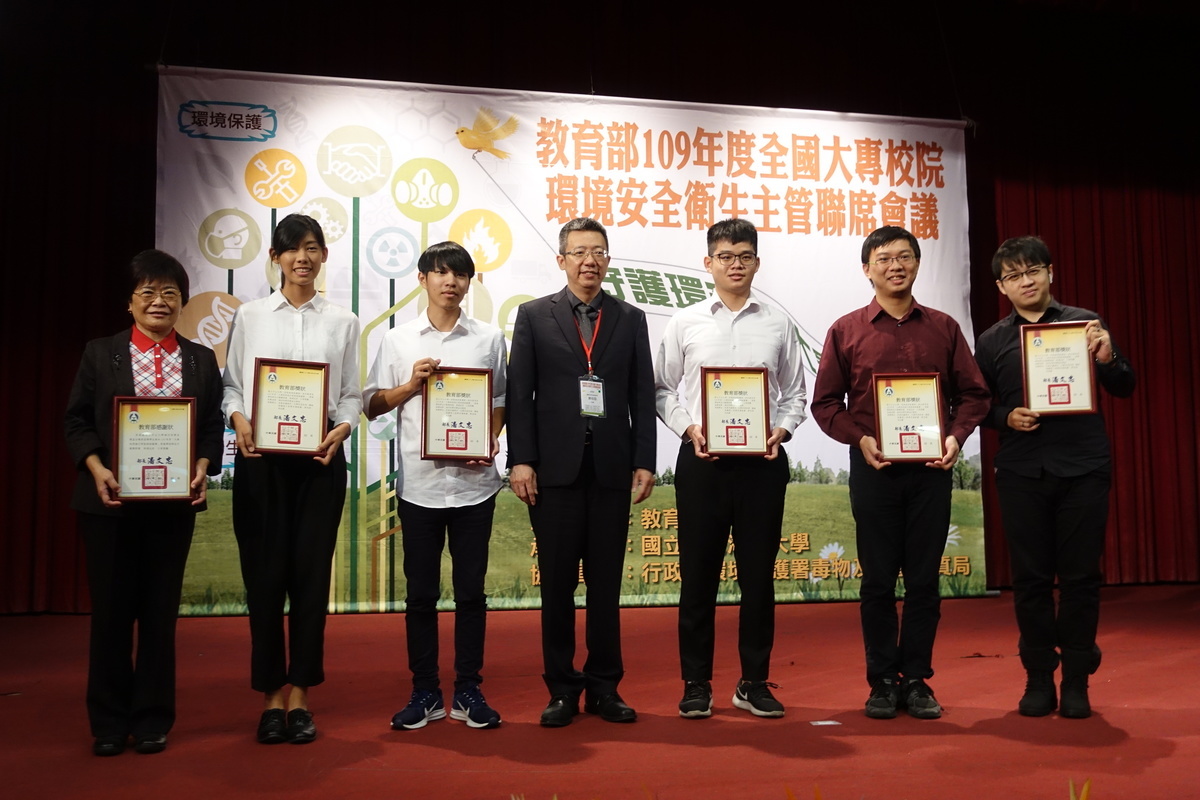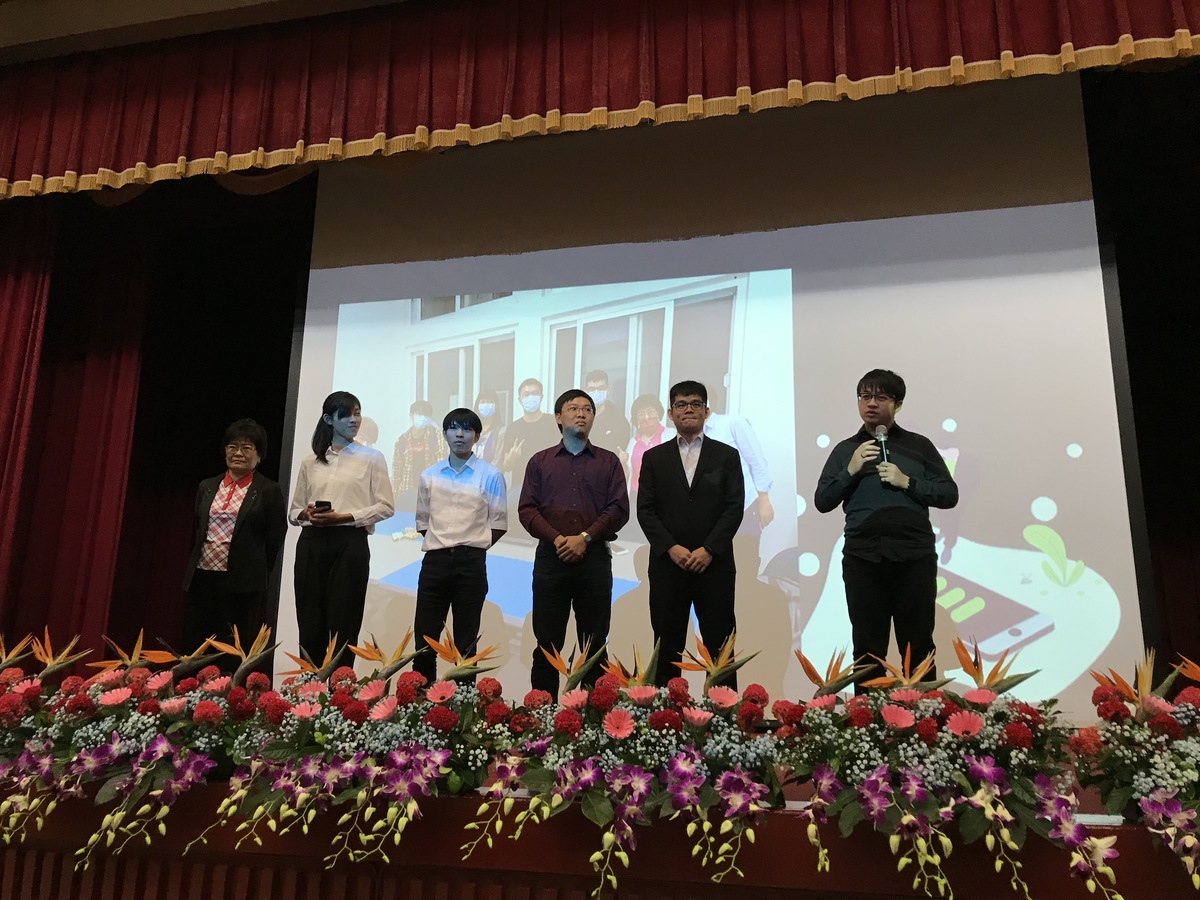NSYSU team wins Excellence Award in MOE’s University Carbon Footprint Reduction Competition


Chairwoman of NSYSU Department of Oceanography, Professor Meng-Hsien Chen, and Associate Professor Shu-Chiu Liu of Si Wan College let the students learn by doing: during the one-year course on the promotion and extension services of environmental education, they formed the Front-Line Carbon Detection Team, which participated in the first University Carbon Footprint Reduction Competition organized by the Ministry of Education and won the Excellence Award as the only team in Taiwan. The team carried out research that found that male students at NSYSU love to eat beef, while female students prefer shrimps. NSYSU students’ food consumption showed a rather high carbon footprint. The students taking the course prepared a simple learning package (SLP) on a low-carbon diet with the aim of changing the dietary habits of NSYSU students to lower the food carbon footprint and achieve the goal of a low-carbon campus.
Professor Chen led the Front-Line Carbon Detection Team, which included: Yu-Hsiang Chou of the Department of Chemistry, Keng-Ju Lu of the Department of Sociology, and three students of the Department of Mechanical and Electrical Engineering: Chun-Teng Yang, Pai-Hsun Liao, and Pin-Hsun Chiu. In the early stage of the project, the cross-disciplinary team also included students of the Department of Oceanography, Yu-Chi Yeh and Tzu-Ching Wang, and a student of the Department of Sociology, Min-Chi Lin. The Front-Line Carbon Detection Team won the Excellence Award as the only participating team, bringing honor to the University.
At first, when working on this project, the students discussed in class how to lower energy use and carbon emissions, and motivate people to take action to reduce the carbon emissions on the NSYSU campus. They decided to start from the carbon emissions related to daily food consumption at the nearby off-campus food stores. To calculate the carbon footprint of the daily dietary habits of the students on campus, the team members conducted the first questionnaire survey on NSYSU students’ food carbon footprint on Facebook, gathering responses from 732 respondents. The results showed a relatively low average carbon footprint of foods chosen by female students but a relatively high footprint for male students. Many male respondents tended to choose beef products, while females preferred shrimps. The survey showed that the students of the College of Engineering and the College of Marine Sciences had the highest food carbon footprints.
After obtaining the first stage survey results, the team members started promoting knowledge of a low-carbon footprint diet to students and started a Facebook fan page “Front-Line Carbon Detection Team detects your carbon footprint” (前線碳測隊,探探你的碳!) to post the SLP on how to achieve the low-carbon goal on campus.
The SLP content on the fan page presented the different stages of the food cycle and knowledge of carbon footprint reduction. The students organized the information into four main topics: “Food ingredients”, explaining the greenhouse gas emissions in the production of poultry, pork, beef, and lamb, and encouraging the students to choose meat and vegetables with a lower carbon footprint; “Buying”, encouraging students to take their own shopping bags when grocery shopping to further contribute to reducing their carbon footprint; “Cooking”, promoting low-energy cooking methods and encouraging the students to cook low-carbon footprint meals; and finally, “Kitchen waste”, explaining the carbon emissions in the processing of kitchen waste.
Through a series of promotional activities, the team members succeeded in raising students’ awareness of greenhouse gas emissions based on a scientific viewpoint. The participating students significantly reduced their food carbon footprint from an average of 6.02 to 5.56. The participating students positively responded to the action and were enthusiastic about reducing their carbon footprint and contributing to making the campus more eco-friendly.
Professor Meng-Hsien Chen said that the team members received an enthusiastic response and comments after posting the information on carbon footprint reduction on the Facebook page; the students posted comments encouraging others to eat less beef, use less energy when cooking, eat a vegetarian diet, and avoid wasting food. This made her realize that students took the carbon footprint reduction project very seriously. “The students put their words into action and started a carbon footprint reduction trend!” she said. After one month of promoting these good results, the reduction in the food carbon footprint of the College of Marine Sciences and the College of Social Sciences was the most evident. Food carbon footprint reduction will be further promoted in the future by service-learning courses on the promotion of environmental education on the NSYSU campus and in the nearby community to fulfill the University’s social responsibility.
Professor Chen led the Front-Line Carbon Detection Team, which included: Yu-Hsiang Chou of the Department of Chemistry, Keng-Ju Lu of the Department of Sociology, and three students of the Department of Mechanical and Electrical Engineering: Chun-Teng Yang, Pai-Hsun Liao, and Pin-Hsun Chiu. In the early stage of the project, the cross-disciplinary team also included students of the Department of Oceanography, Yu-Chi Yeh and Tzu-Ching Wang, and a student of the Department of Sociology, Min-Chi Lin. The Front-Line Carbon Detection Team won the Excellence Award as the only participating team, bringing honor to the University.
At first, when working on this project, the students discussed in class how to lower energy use and carbon emissions, and motivate people to take action to reduce the carbon emissions on the NSYSU campus. They decided to start from the carbon emissions related to daily food consumption at the nearby off-campus food stores. To calculate the carbon footprint of the daily dietary habits of the students on campus, the team members conducted the first questionnaire survey on NSYSU students’ food carbon footprint on Facebook, gathering responses from 732 respondents. The results showed a relatively low average carbon footprint of foods chosen by female students but a relatively high footprint for male students. Many male respondents tended to choose beef products, while females preferred shrimps. The survey showed that the students of the College of Engineering and the College of Marine Sciences had the highest food carbon footprints.
After obtaining the first stage survey results, the team members started promoting knowledge of a low-carbon footprint diet to students and started a Facebook fan page “Front-Line Carbon Detection Team detects your carbon footprint” (前線碳測隊,探探你的碳!) to post the SLP on how to achieve the low-carbon goal on campus.
The SLP content on the fan page presented the different stages of the food cycle and knowledge of carbon footprint reduction. The students organized the information into four main topics: “Food ingredients”, explaining the greenhouse gas emissions in the production of poultry, pork, beef, and lamb, and encouraging the students to choose meat and vegetables with a lower carbon footprint; “Buying”, encouraging students to take their own shopping bags when grocery shopping to further contribute to reducing their carbon footprint; “Cooking”, promoting low-energy cooking methods and encouraging the students to cook low-carbon footprint meals; and finally, “Kitchen waste”, explaining the carbon emissions in the processing of kitchen waste.
Through a series of promotional activities, the team members succeeded in raising students’ awareness of greenhouse gas emissions based on a scientific viewpoint. The participating students significantly reduced their food carbon footprint from an average of 6.02 to 5.56. The participating students positively responded to the action and were enthusiastic about reducing their carbon footprint and contributing to making the campus more eco-friendly.
Professor Meng-Hsien Chen said that the team members received an enthusiastic response and comments after posting the information on carbon footprint reduction on the Facebook page; the students posted comments encouraging others to eat less beef, use less energy when cooking, eat a vegetarian diet, and avoid wasting food. This made her realize that students took the carbon footprint reduction project very seriously. “The students put their words into action and started a carbon footprint reduction trend!” she said. After one month of promoting these good results, the reduction in the food carbon footprint of the College of Marine Sciences and the College of Social Sciences was the most evident. Food carbon footprint reduction will be further promoted in the future by service-learning courses on the promotion of environmental education on the NSYSU campus and in the nearby community to fulfill the University’s social responsibility.
Click Num:
Share
